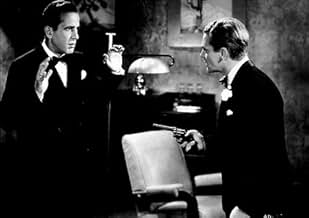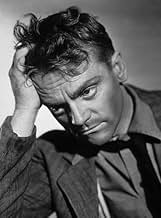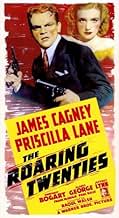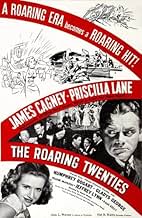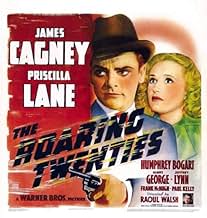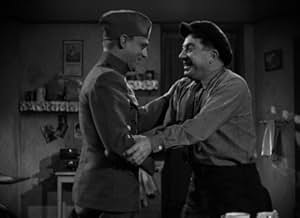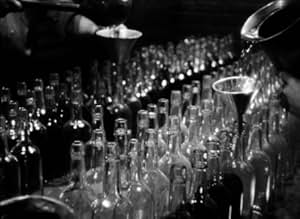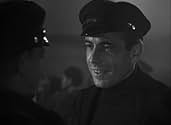IMDb-BEWERTUNG
7,9/10
16.837
IHRE BEWERTUNG
Zwei ehemalige arbeitslose Kriegskameraden (James Cagney und Humphrey Bogart) verdienen sich nach dem Ersten Weltkrieg ihren Unterhalt als Alkoholschmuggler.Zwei ehemalige arbeitslose Kriegskameraden (James Cagney und Humphrey Bogart) verdienen sich nach dem Ersten Weltkrieg ihren Unterhalt als Alkoholschmuggler.Zwei ehemalige arbeitslose Kriegskameraden (James Cagney und Humphrey Bogart) verdienen sich nach dem Ersten Weltkrieg ihren Unterhalt als Alkoholschmuggler.
- Auszeichnungen
- 4 wins total
Elisabeth Risdon
- Mrs. Sherman
- (as Elizabeth Risdon)
Edward Keane
- Henderson
- (as Ed Keane)
Eddy Chandler
- Second Detective
- (as Eddie Chandler)
John Deering
- Narrator
- (Synchronisation)
Empfohlene Bewertungen
Most of the famous gangster films were made in the early part of the decade, before the infamous Production Code took all the sex and violence out of the movies, and before they figured out how to make decent movies with sound. The landmark films of the genre like "Little Caesar" and "Public Enemy" are actually kind of poorly made, by modern standards.
Not so this entertaining film, it's full of life and energy and great fun to watch. James Cagney gives a wonderful performance as a dynamic and ambitious man who goes from a barely-eating taxi driver to a gang lord, and back again. Humphrey Bogart gives one of his best pre-Casablanca villain performances, and even generic leading lady Priscilla Land is fresh and likeable.
The only quibble I have with this film is it lacks the immediacy of the earlier "ripped from the headlines" films. It's made about days that had since gone by, and owes more to earlier films than the reality of the day (post-modernism in the thirties?). Still, it's great fun, do see it.
Not so this entertaining film, it's full of life and energy and great fun to watch. James Cagney gives a wonderful performance as a dynamic and ambitious man who goes from a barely-eating taxi driver to a gang lord, and back again. Humphrey Bogart gives one of his best pre-Casablanca villain performances, and even generic leading lady Priscilla Land is fresh and likeable.
The only quibble I have with this film is it lacks the immediacy of the earlier "ripped from the headlines" films. It's made about days that had since gone by, and owes more to earlier films than the reality of the day (post-modernism in the thirties?). Still, it's great fun, do see it.
It is not as centrally dynamic as THE PUBLIC ENEMY nor as Freudian as WHITE HEAT, but THE ROARING TWENTIES is a leading gangster film for Jimmy Cagney as it details the rise and fall of a gangster Eddie Bartlett. The product of World War I and Prohibition, Eddie rises to great power as the head of a gang, always trying to return to legitimate society, and then to fall again due to the Wall Street Crash and the machinations of his right-hand man George Hally (Humphrey Bogart).
Both men's characters are far more subtle as studies of success in criminal enterprise than the normal crime bosses of the 1930s. Eddie painstakingly builds up a taxicab corporation to gain legitimacy, as well as his stock acquisitions. Bogart, a bit more realistic on what types of businesses he understands, does not get involved in the stock market. But he enjoys the trappings of the upper class. Witness the scene when he is talking with his underling (Abner Biberman) and he is practicing his putting in his office. At the conclusion, Bogart is living in a townhouse (a sign of his financial success).
There is a tradition in the films of the depression that some gangsters are not as bad as others. This is not to be taken seriously in real life, but the idea is that certain people are driven to crime by economic circumstances (Cagney returning to no job at the end of World War I) and some are driven by pure evil (the sadistic side of Bogart's nature). Cagney, on his rise, gains the friendship of people like Gladys George (actually the unrequited love of Ms George) and tries to find room in his organization for people like Frank McHugh, a nice guy who really never fit in properly as a criminal - and dies as a result. Bogart gains the support of like villains (Bibberman, who shares Bogie's fate at the end), and keeps showing a contempt for human life in most of the film (witness how he kills a cop on one of the rum runners he and Cagney are on, because the cop was once his sergeant in the army who punished him for breaking the rules when he did). But Cagney turns out to have more guts in him than Bogie. At the end of the film the latter, facing his own demise, turns into a total coward.
The film has many touches to set the tone of the 21 years it covers (1918 - 1939). At the start newsreel footage takes the audience back to the end of World War I, showing Presidents and events up to Wilson (who, curiously enough, is shown by an actor playing the President, not as part of an old film). It has been noted that Gladys George's Panama is based on Texas Guinan, the speakeasy hostess. The death of Cagney on the steps of a church is based on the death of Hymie Weiss, a Chicago gangster rival of Capone who was killed that way in 1927. It was too good a death to not use in a gangster film, as it seems more symbolic than it was in real life (it does remind us of how Cagney, for all his good intentions, came up short due to his profession in violence).
I have not commented on the love triangles involving Cagney, Jeffrey Lynn, and Priscilla Lane (and Cagney, Lane, and Gladys George). The irony that Cagney never sees that George is more than just a good friend is rather poignant, for both of them. And it is George who cradles his dead body in the end and gives his epitaph. Perhaps today a director would allow Cagney to wise up and get away with George. But that would spoil the full effect of the film's conclusion.
Both men's characters are far more subtle as studies of success in criminal enterprise than the normal crime bosses of the 1930s. Eddie painstakingly builds up a taxicab corporation to gain legitimacy, as well as his stock acquisitions. Bogart, a bit more realistic on what types of businesses he understands, does not get involved in the stock market. But he enjoys the trappings of the upper class. Witness the scene when he is talking with his underling (Abner Biberman) and he is practicing his putting in his office. At the conclusion, Bogart is living in a townhouse (a sign of his financial success).
There is a tradition in the films of the depression that some gangsters are not as bad as others. This is not to be taken seriously in real life, but the idea is that certain people are driven to crime by economic circumstances (Cagney returning to no job at the end of World War I) and some are driven by pure evil (the sadistic side of Bogart's nature). Cagney, on his rise, gains the friendship of people like Gladys George (actually the unrequited love of Ms George) and tries to find room in his organization for people like Frank McHugh, a nice guy who really never fit in properly as a criminal - and dies as a result. Bogart gains the support of like villains (Bibberman, who shares Bogie's fate at the end), and keeps showing a contempt for human life in most of the film (witness how he kills a cop on one of the rum runners he and Cagney are on, because the cop was once his sergeant in the army who punished him for breaking the rules when he did). But Cagney turns out to have more guts in him than Bogie. At the end of the film the latter, facing his own demise, turns into a total coward.
The film has many touches to set the tone of the 21 years it covers (1918 - 1939). At the start newsreel footage takes the audience back to the end of World War I, showing Presidents and events up to Wilson (who, curiously enough, is shown by an actor playing the President, not as part of an old film). It has been noted that Gladys George's Panama is based on Texas Guinan, the speakeasy hostess. The death of Cagney on the steps of a church is based on the death of Hymie Weiss, a Chicago gangster rival of Capone who was killed that way in 1927. It was too good a death to not use in a gangster film, as it seems more symbolic than it was in real life (it does remind us of how Cagney, for all his good intentions, came up short due to his profession in violence).
I have not commented on the love triangles involving Cagney, Jeffrey Lynn, and Priscilla Lane (and Cagney, Lane, and Gladys George). The irony that Cagney never sees that George is more than just a good friend is rather poignant, for both of them. And it is George who cradles his dead body in the end and gives his epitaph. Perhaps today a director would allow Cagney to wise up and get away with George. But that would spoil the full effect of the film's conclusion.
1939 was such a classic, milestone year for film cinema. So many great films, 'The Wizard of Oz' and 'Gone With the Wind' even being masterpieces. 'The Roaring Twenties' had a lot of talent involved, James Cagney and Humphrey Bogart both had career full of great and more performances and Raoul Walsh (in a different film for him at this stage of his career) sure could direct. Also like the genre 'The Roaring Twenties' fits under.
'The Roaring Twenties' did not disappoint. While it is quite rightly highly regarded today, considered by quite a number of people a genre classic and great representations of both Cagney and Bogart, it is a shame that it was over-shadowed by a lot of other films that year and doesn't get as much attention. 'The Roaring Twenties' may not quite be a film milestone in the way that the best films from such a great year are, but it is a great film in my view and deserves the high praise it gets.
It is not quite perfect, with it being a bit of a slow starter and a film that didn't grab my attention straightaway.
Luckily, 'The Roaring Twenties' got going very quickly. And when it did get going, boy did it blister. The photography is atmospheric and very stylish, the noir-ish lighting also adding to the impact. Was amazed at how evocative the Prohibition setting was. The music is appropriately moody without getting bombastic or syrupy and Walsh's direction is remarkably skillful in how vividly the deceptively gleaming yet very ominous at times setting is portrayed. As well in generating suspense.
Something that 'The Roaring Twenties' does incredibly well in. The script has a sharp wit and tight tautness, with some quite hard to forget quotes. Cagney's last line, one of his greatest, really stands out, the very last line of the whole film likewise. Also really loved the hard boiled edge exchanges of dialogue between Eddie and George, delivering on the entertainment value too. The story is both entertaining and suspenseful, especially in the exciting final third. Cagney's exit is one of his greatest.
Characters are well written, personally found George and especially Eddie (very meaty) very well defined. The acting is just right, Cagney is just terrific in a role that is so perfect for him and one that he played extremely well and better than most in that type of role. Bogart has great laconic intensity and steel, giving one of his best pre-'Casablanca' performances.
Altogether, great. 9/10
'The Roaring Twenties' did not disappoint. While it is quite rightly highly regarded today, considered by quite a number of people a genre classic and great representations of both Cagney and Bogart, it is a shame that it was over-shadowed by a lot of other films that year and doesn't get as much attention. 'The Roaring Twenties' may not quite be a film milestone in the way that the best films from such a great year are, but it is a great film in my view and deserves the high praise it gets.
It is not quite perfect, with it being a bit of a slow starter and a film that didn't grab my attention straightaway.
Luckily, 'The Roaring Twenties' got going very quickly. And when it did get going, boy did it blister. The photography is atmospheric and very stylish, the noir-ish lighting also adding to the impact. Was amazed at how evocative the Prohibition setting was. The music is appropriately moody without getting bombastic or syrupy and Walsh's direction is remarkably skillful in how vividly the deceptively gleaming yet very ominous at times setting is portrayed. As well in generating suspense.
Something that 'The Roaring Twenties' does incredibly well in. The script has a sharp wit and tight tautness, with some quite hard to forget quotes. Cagney's last line, one of his greatest, really stands out, the very last line of the whole film likewise. Also really loved the hard boiled edge exchanges of dialogue between Eddie and George, delivering on the entertainment value too. The story is both entertaining and suspenseful, especially in the exciting final third. Cagney's exit is one of his greatest.
Characters are well written, personally found George and especially Eddie (very meaty) very well defined. The acting is just right, Cagney is just terrific in a role that is so perfect for him and one that he played extremely well and better than most in that type of role. Bogart has great laconic intensity and steel, giving one of his best pre-'Casablanca' performances.
Altogether, great. 9/10
"The Roaring Twenties" more or less marked the end of Warner Bros. gangster films popular during the 1930s. For the next few years WWII would form the backdrop of their action films.
This one is full of action and memorable characters due largely to the presence of legendary director Raoul Walsh and its stellar cast.
Three soldiers meet on the WWI battlefield in 1918. One is the all good lawyer Lloyd Hart (Jeffrey Lynn), one the thoroughly bad George Hally (Humphrey Bogart) and the third, an everyman named Eddie Bartlett (James Cagney). Eddie is smitten with a girl, Jean Sherman (Priscilla Lane) who has been corresponding with him from home.
When the war ends Eddie returns to New York and hooks up with buddy Danny Green (Frank McHugh) who is a Gabie. Eddie goes to meet Jean but is disappointed to learn that she is just a teenager. Unable to find work, Eddie is forced to share the driving of Danny's cab. In the meantime, prohibition takes effect and Eddie discovers that bootlegging is the way to get rich. At the onset he meets saloon girl Panama Smith (Gladys George) who turns out to be his only friend.
Fast forward to 1924 and Eddie re-discovers Jean in a chorus line and decides to take a hand in her career. Eddie is now hopelessly in love with Jean much to the dismay of Panama. Jean however, is in love with Lloyd who has turned up as Eddie's lawyer. One night while hijacking a load of booze from rival gangster Nick Brown (Paul Kelly), Eddie meets up with George Hally (what are the chances of that?) who works for Brown. Hally decides to double cross Brown and throw in with Eddie. All the while Eddie is buying up taxis until he has immersed a fleet of 2,000 cabs.
Everything is running smoothly until Hally begins to get his own ambitions and sets up Brown to Murder Eddie. The plot fails. Meanwhile Jean leaves Eddie and runs off with Lloyd and Eddie begins to drink. At the same time come the stock market crash of 1929 and Eddie is ruined. Hally however, didn't play the stocks and buys out Eddie's cab business for a small figure and leaves Eddie with but one cab for himself.
Eddie hits the skids along with the ever faithful Panama until Hally threatens Jean and Lloyd and.............
Cagney as usual dominates the picture. He is his usual cocky Irish tough guy but with character flaws. His love for Jean ultimately is what destroys him. Lane contributes a couple of classic songs (in her own voice) as Jean. Bogart as the thoroughly evil Hally gives us a preview of the Bogart tough guy image to come in the 40s. Gladys George almost steals the picture from Cagney as the tragic Panama and McHugh is sympathetic as Danny.
Oddly enough, for a gangster picture, there are no major characters in respect of crusading cops or district attorneys. All of the action is between the gangsters.
Cagney would not appear in another gangster film for ten years until "White Heat" (1949).
This one is full of action and memorable characters due largely to the presence of legendary director Raoul Walsh and its stellar cast.
Three soldiers meet on the WWI battlefield in 1918. One is the all good lawyer Lloyd Hart (Jeffrey Lynn), one the thoroughly bad George Hally (Humphrey Bogart) and the third, an everyman named Eddie Bartlett (James Cagney). Eddie is smitten with a girl, Jean Sherman (Priscilla Lane) who has been corresponding with him from home.
When the war ends Eddie returns to New York and hooks up with buddy Danny Green (Frank McHugh) who is a Gabie. Eddie goes to meet Jean but is disappointed to learn that she is just a teenager. Unable to find work, Eddie is forced to share the driving of Danny's cab. In the meantime, prohibition takes effect and Eddie discovers that bootlegging is the way to get rich. At the onset he meets saloon girl Panama Smith (Gladys George) who turns out to be his only friend.
Fast forward to 1924 and Eddie re-discovers Jean in a chorus line and decides to take a hand in her career. Eddie is now hopelessly in love with Jean much to the dismay of Panama. Jean however, is in love with Lloyd who has turned up as Eddie's lawyer. One night while hijacking a load of booze from rival gangster Nick Brown (Paul Kelly), Eddie meets up with George Hally (what are the chances of that?) who works for Brown. Hally decides to double cross Brown and throw in with Eddie. All the while Eddie is buying up taxis until he has immersed a fleet of 2,000 cabs.
Everything is running smoothly until Hally begins to get his own ambitions and sets up Brown to Murder Eddie. The plot fails. Meanwhile Jean leaves Eddie and runs off with Lloyd and Eddie begins to drink. At the same time come the stock market crash of 1929 and Eddie is ruined. Hally however, didn't play the stocks and buys out Eddie's cab business for a small figure and leaves Eddie with but one cab for himself.
Eddie hits the skids along with the ever faithful Panama until Hally threatens Jean and Lloyd and.............
Cagney as usual dominates the picture. He is his usual cocky Irish tough guy but with character flaws. His love for Jean ultimately is what destroys him. Lane contributes a couple of classic songs (in her own voice) as Jean. Bogart as the thoroughly evil Hally gives us a preview of the Bogart tough guy image to come in the 40s. Gladys George almost steals the picture from Cagney as the tragic Panama and McHugh is sympathetic as Danny.
Oddly enough, for a gangster picture, there are no major characters in respect of crusading cops or district attorneys. All of the action is between the gangsters.
Cagney would not appear in another gangster film for ten years until "White Heat" (1949).
Sometimes I come to a film because it looks like it can directly fulfill, sometimes because it can provide precious background to other things that matter, letting them stand.
It's watchable in itself, this one; a misfit's rise and fall played against the passing of times. Released on the cusp of WWII, it opened a portal back to more careless times, taking us on a journey from WWI trenches through the highs of Prohibition to the lows of Depression, so we could have this clear moral stance: in the new world there's no room for scoundrels. Right.
Interesting here is that only a year or two before Citizen Kane we have a similar saga about the passing of the times, but one that asks no fundamental question of us, casts no doubt on its testimony. It's as lurid and constructed as newspaper headlines of the time, a main contrast in Welles' film about its world-creating newspaperman. It's machinegun history written in the staccato sounds of a newspaperman's typewriter.
What I really wanted to see though was Cagney.
I am in the middle of a film noir quest looking for its machinery, and as an aside I was brought to explore its roots in 1930's crime stuff. Cagney is a force in this niche. He had so much energy that he could turn into presence. He is not just amused, he doesn't coast on pushing things back like Bogart; he throws himself on the encounter, bitterly cutting himself on the edges.
Not so here. He was asked to play a basically decent guy led astray by the prospect of easy money, meaning to reflect the broader American endeavor that ended on Black Tuesday. Usually in a Cagney film he lets loose in the end. They asked of him here the precise opposite; he sleepwalks, numbed by failure, a human ruin clawing at redemption. He looks like he gives it his all, but it's just not who he is. It's as if you asked Welles to strut like Wayne.
If you want to see Cagney in top form, look him up in Footlight Parade fully in command of a show, White Heat to see him face real demons.
It's watchable in itself, this one; a misfit's rise and fall played against the passing of times. Released on the cusp of WWII, it opened a portal back to more careless times, taking us on a journey from WWI trenches through the highs of Prohibition to the lows of Depression, so we could have this clear moral stance: in the new world there's no room for scoundrels. Right.
Interesting here is that only a year or two before Citizen Kane we have a similar saga about the passing of the times, but one that asks no fundamental question of us, casts no doubt on its testimony. It's as lurid and constructed as newspaper headlines of the time, a main contrast in Welles' film about its world-creating newspaperman. It's machinegun history written in the staccato sounds of a newspaperman's typewriter.
What I really wanted to see though was Cagney.
I am in the middle of a film noir quest looking for its machinery, and as an aside I was brought to explore its roots in 1930's crime stuff. Cagney is a force in this niche. He had so much energy that he could turn into presence. He is not just amused, he doesn't coast on pushing things back like Bogart; he throws himself on the encounter, bitterly cutting himself on the edges.
Not so here. He was asked to play a basically decent guy led astray by the prospect of easy money, meaning to reflect the broader American endeavor that ended on Black Tuesday. Usually in a Cagney film he lets loose in the end. They asked of him here the precise opposite; he sleepwalks, numbed by failure, a human ruin clawing at redemption. He looks like he gives it his all, but it's just not who he is. It's as if you asked Welles to strut like Wayne.
If you want to see Cagney in top form, look him up in Footlight Parade fully in command of a show, White Heat to see him face real demons.
Wusstest du schon
- WissenswertesThis marked the end of James Cagney's cycle of gangster films for Warner Bros. Cagney wanted to diversify his roles: he would not play a gangster again until Maschinenpistolen (1949), ten years later.
- PatzerThe film is full of classic songs from the 1920s, but the arrangements and vocal styles are those of 1939. No attempt is made to reproduce the sound of 1920s dance music.
- Zitate
[last lines]
Panama Smith: He's dead.
Cop: Well, who is this guy?
Panama Smith: This is Eddie Bartlett.
Cop: Well, how're you hooked up with him?
Panama Smith: I could never figure it out.
Cop: What was his business?
Panama Smith: He used to be a big shot.
- VerbindungenEdited from Der öffentliche Feind (1931)
- SoundtracksI'm Just Wild About Harry
(1921) (uncredited)
Music by Eubie Blake
Lyrics by Noble Sissle
Played during the opening and closing credits
Also played during the 1922 montage
Sung by Priscilla Lane at the club
Top-Auswahl
Melde dich zum Bewerten an und greife auf die Watchlist für personalisierte Empfehlungen zu.
- How long is The Roaring Twenties?Powered by Alexa
Details
- Laufzeit
- 1 Std. 46 Min.(106 min)
- Farbe
- Sound-Mix
- Seitenverhältnis
- 1.37 : 1
Zu dieser Seite beitragen
Bearbeitung vorschlagen oder fehlenden Inhalt hinzufügen


